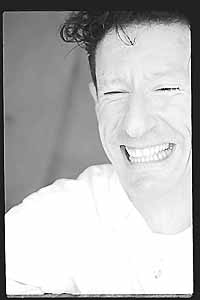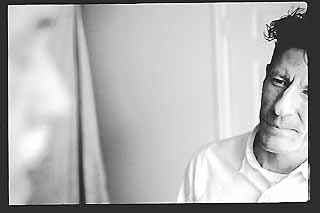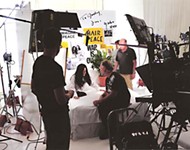Lyle Lovett
By Jody Denberg, Fri., Sept. 11, 1998
 What kind of guy is Lyle Lovett, really? Well, what you see and hear is truly what you get with Lovett — and then some. The halting, spoken-word delivery he uses onstage and in song reflects his need to express himself precisely as well as his underlying perfectionism. The fastidious detail in his musical arrangements also speaks of his need to get things right, whether he's riding his Ducates motorcycle or acting in major motion pictures. Lyle Lovett didn't get this far without knowing what he wants and knowing how to get it, yet he creates musical magic with an insouciance that's at once charming and misleading. Like the best players, he makes it look easy.
What kind of guy is Lyle Lovett, really? Well, what you see and hear is truly what you get with Lovett — and then some. The halting, spoken-word delivery he uses onstage and in song reflects his need to express himself precisely as well as his underlying perfectionism. The fastidious detail in his musical arrangements also speaks of his need to get things right, whether he's riding his Ducates motorcycle or acting in major motion pictures. Lyle Lovett didn't get this far without knowing what he wants and knowing how to get it, yet he creates musical magic with an insouciance that's at once charming and misleading. Like the best players, he makes it look easy.
For our interview, Lovett walks into the room accompanied by a beautiful woman, his trademark hair casually tucked under a backwards gimme cap. He holds an early pressing of his new 2-CD set, Step Inside This House (due September 22), complete with a mock-up of the artwork that will accompany it. Flipping through the booklet's elegant, austere black-and-white photos of himself with many of the songwriters whose work he interprets on the album, Lovett is at once a fan and an artist. He makes it clear that he didn't set out to create the definitive Texas singer-songwriter primer, only to record the songs that motivated him to embark on his own unique musical journey. For some, Step Inside This House will be an education, for others it will be a trip back in time. For Lyle Lovett it's both.
Austin Chronicle: Artists often go back to their roots at a certain point in their careers. They want to wipe the slate clean. They want to get in touch with their original impulses for making music. What was your motivation for recording this album of other people's songs?
Lyle Lovett: Well, that was really it, Jody. These are songs that I've played for years; some of these songs I learned before I started writing songs myself. These songwriters were a big influence on me, and it just felt like a good time for me to go back and take a look at these songs and play them.
AC: Where did you grow up?
LL: I grew up outside of Houston, outside of Spring, Texas, and was able to go and hear songwriters like Guy Clark and Townes Van Zandt and Willis Alan Ramsey, and get to open shows for songwriters like Eric Taylor and Vince Bell, whose songs are also on the record.
AC: Did you always want to be a singer-songwriter?
LL: I played guitar when I was young and never really considered it as a way to make a living. But I always enjoyed it, and as I got older and was able to start going to clubs, I found that I really enjoyed hearing people do their own songs. So I became attracted to singer-songwriters. I became interested in them as people, in a way, and was curious about what singer-songwriters had to say, what they wanted to say. That was as much a part of the appeal of a singer-songwriter to me as the music itself.
AC: How old were you?
LL: Oh, we're talking like 1974-75, when I was 17, 18.
AC: I'm imagining that most of the clubs you first went to were in Houston?
LL: They were. Most of the clubs I first went to were in Houston. And then I would drive over to Austin occasionally. A buddy of mine from high school who had gone to school at the University of Texas, he and I played together some. He would go and check out music here in Austin and invite me up, and we'd hang out and go and hear people.
AC: Which clubs?
LL: One of the first shows I ever saw here was Willis Alan Ramsey at the Paramount, which is a theatre, not a club. But to see Willis for the first time after having lived with his record and tried to learn every song on the record, to be able to see him and how he stood onstage, I was just captivated.
AC: A few years later, you went to Texas A&M. Were you playing out in clubs while you were in college?
LL: I got to hang out at some of the local music establishments and got involved with the student union committee, which had a local coffeehouse that was mainly a forum for student musicians to play and sing. Occasionally, once or twice a semester, we would bring in regional performers to perform. But I got involved with the coffeehouse and got involved with the programming aspect of it, so I eventually got to help — or got to book, really, the shows that played there.
AC: And you were studying journalism. Did you ever wind up interviewing musicians?
LL: I never worked as a journalist. Fortunately, I've never had a job. But I did get to do some interviews with performers as they came through town to play at Texas A&M. I did interview Steven Fromholz, and I interviewed Michael Martin Murphey, and I interviewed Willis Alan Ramsey. I interviewed Nanci Griffith. That's how I met her. The first interview I did with a musician was Don Sanders, who is a longtime Houston singer-songwriter and also a big influence. I also interviewed Eric Taylor. I had a really great time talking to singer-songwriters and trying to pick their brain and see how they worked.
AC: When did you get your first publishing deal? When did you realize you were going to write songs and make a career out of it?
LL: By 1984, I had been playing the same half a dozen clubs. You know, every month or six weeks I'd kind of make the rounds and really thought to myself that it was time to try to learn something about the business and really try to make a go of the music business or try to figure out what to do with myself.
So I had a chance to go to Nashville and work with Nanci Griffith. She was recording an album there that came out on Rounder Records called Once in a Very Blue Moon. And she'd asked me to sing some background vocals. She recorded one of my songs and asked me to sing with her. And while I was in Nashville, I took the opportunity to make a few phone calls and try to set up some meetings with publishers and try to learn something about the business.
AC: Now, in the years since those early days, you've gone from being an upstart to being a peer of a lot of the people that you looked up to. But there's a couple of writers whose songs that you champion on Step Inside This House that are no longer alive and they're without peer. One is Townes Van Zandt.
LL: Townes Van Zandt, I think, is regarded by any singer-songwriter from Texas in the highest way. It's hard to think of Townes Van Zandt and not mention Guy Clark as well. Guy and Townes were longtime friends, and I think, influences on one another. So I always think of Guy and Townes together, really. But as you know, we lost Townes last year. And, gosh, the first album of Townes' I ever bought was The Late, Great Townes Van Zandt. I heard Don Sanders in Houston play "Pancho and Lefty." That was the first I'd ever heard of Townes. He introduced the song and said who had written it, and I went out and foundThe Late, Great Townes Van Zandt. It was one of those albums I tried to learn every song on.
AC: You play so many different styles of music — folk, country, jazz, gospel, swing, and blues. Do you sometimes feel like you're on a mission to expose lesser-known styles like Texas Swing to people who listen to rock and pop music?
LL: If people discover great Texas music like Bob Wills or even Ray Benson's Asleep at the Wheel stuff because of what I'm doing, that's really gratifying. But I don't feel like I'm on a mission like that at all. I'm really just trying to do things that I enjoy. I'm trying to play music that I like to play and like to listen to. I just have to think if I like those different kinds of music, there are other people who aren't so different from me.
AC: On Step Inside This House, you sing songs written by other people. Did you feel like you didn't have to deal with your own emotions as much making this album because you weren't doing the writing?
LL: You know, it was a different kind of responsibility. First of all, these songs speak for me. They're all songs that I wish I had written, so they do really speak to my emotions. But it was a different kind of responsibility in the studio. I found myself wanting to communicate the songs in a way that was true to the songwriter's original intent or my perception of the songwriter's original intent. That was the challenge of it, really, was to be respectful of the songs and the songwriters and try to get that right.

AC: Guy Clark's "Step Inside This House," really sums up the album conceptually, doesn't it?
LL: I learned "Step Inside This House" from Eric Taylor years ago and got to do some shows a few years back with Guy Clark, Joe Ely, John Hiatt — songwriter-in-the-round kind of shows. We did about a half a dozen of them in different places across the country. And one night, I introduced that song. We were all playing our own songs, but one night I introduced that song and played it for Guy because I knew that Guy hadn't performed it onstage in years. He told me that night — told the audience — that it was the first song he had ever written.
I was really pleased to play it for him and surprise him, but I didn't realize it was the first song that Guy had ever written. It's such a beautiful song. And just the idea of it, inviting someone in, did seem appropriate to me. I want people to sort of, you know, feel as though they're invited to listen to these songs by these great songwriters. I'm such a fan of these songwriters. And these songs, I think, are all wonderful examples of their work. It was very difficult deciding which songs to do by these songwriters, because they all have so many wonderful songs.
AC: These songs often sound like they're taken from the diaries of the writers who wrote them. Do you think that listeners can read too much into songs — that they assume everything is a first-person account?
LL: You never know for sure as a listener what's what. Even if a song ends up being a big lie, there's always a kernel of truth somewhere in songs for me, even if it's the real experience that inspires an imaginary one in the song. As a member of the audience and listening to songs by somebody like Guy Clark, I find myself wondering the same thing.
AC: In one of the songs on Step Inside This House, you sing, "I surely know the songs that suit me best." I think it's the David Rodriguez song, "Ballad of the Snow Leopard and the Tanqueray Cowboy." Is there a shared quality on these songs that draws you to them other than the fact they're all written by Texans?
LL: I think any singer-songwriter who sang that line would feel as though that's something you really want to say, because writing songs and singing your own songs is all about individual expression. That's a gratifying line to sing.
The shared quality among these songs, I think, is the great storytelling. It's the great narrative; the imagery, the subtlety of the narrative in some cases — the subtlety of the humor in Willis Alan Ramsey's song "Sleepwalking," the irony in Michael Murphey's song "West Texas Highway."
AC: Now, some of these guys, you grew up listening to. But Robert Earl Keen is a peer of yours. First of all, let's clear this up once and for all. Were you a roommate of Robert's in college?
LL: I lived down the street from Robert. Robert lived in a house that everybody sort of hung out at in between classes at school. There were always people at Robert's house, whether he was there or not. There was always somebody sitting on his porch, playing a guitar or playing a fiddle. So we all just kind of met up over at Robert's. And that's how I got to know him, just wandering by and seeing people outside playing.
Robert is the only one of these singer-songwriters who was my friend before I learned his songs. Luckily and happily, I've gotten to know each of these singer-songwriters over the years. But I first came to know them because of their music and got to know them later, either from interviewing them or from getting to meet them after I started making records. Robert was my friend. If the rest of these songwriters were my teachers, Robert was like my classmate. And I remember the day he first played "Rollin' By" for me after he had just written it. I made him play it enough times that I could learn it sitting right there on his porch.
AC: There are countless mentions of Texas on the new album, and of course, there's Michael Martin Murphey's "West Texas Highway." Now, is it true, this is one of the first songs you ever played onstage and that Michael Martin Murphey never recorded it?
LL: Murphey didn't record this song, but it was recorded by a band called Three Faces West that Ray Wiley Hubbard was in at one point and Rick Fowler; I think they were a New Mexico-based band at that time, out of Red River. They recorded a live album at a club called The Outpost, and "West Texas Highway" was on that album.
I first heard the song, though, at a [Michael Martin Murphey] concert in 1975. It was when "Wild Fire" was a big hit on the radio, and I didn't know what to expect other than "Wild Fire." And I went to the show and Murphey came out with just his guitar, all by himself, and played the first half of the show like that, just by himself. He told stories in between songs. He introduced the songs and stood there and played and sang. I watched him and I thought, "Man, I wish I could do that."

AC: On disc two, like the first disc, a Steven Fromholz song kicks things off. The first CD has "Bears" while the second begins with "Texas Trilogy," which is a legendary song cycle here in the heart of Texas. But a lot of people don't even know about Steven Fromholz.
LL: I learned about Steven on Austin City Limits. He and Larry Nye, just the two of them, played an Austin City Limits show, and I saw it on television. Not long after I started hearing about these singer-songwriters and hearing their songs, I came across Jan Reid's book, The Improbable Rise of Redneck Rock, which featured chapters on many of these songwriters: Steven Fromholz, Michael Martin Murphey, Willis Alan Ramsey, and other great Texas singer-songwriters like B.W. Stephenson and Willie Nelson, of course, and Jerry Jeff Walker, Rusty Wier, Bobby Bridger.
That book was a wonderful guide to finding out about many of these singer-songwriters, for me. And Fromholz — the chapter on Fromholz was really insightful. The first time I listened to "Texas Trilogy," it reminded me of where I'm from, outside of Houston. It reminded me of the changes that have taken place in a place, that for me, was a rural place that has been kind of overtaken by the big city, by Houston. Fromholz's song talks about progress in that way and what happens to people and to the place. And that's a song I've always loved.
AC: There's such a sense of place on the album that people who've never been to Texas will get some of the essence of it, I think.
LL: That's a quality about these songs and about these songwriters. It's a lesson that I learned from these songwriters. When Guy Clark writes about a specific place in "Texas, 1947," when he writes about the train that comes through Monahans, you know he's talking about changes in the world. He's not just talking about that train, he's talking about something that anybody in the world could relate to. These songwriters, these songs, deal in the specific, but not to the exclusion of anything. They talk in detail about a specific place, but in that, anybody, anywhere in the world could relate his own experience to it.
AC: On Step Inside This House you cover a writer who was also a great singer: Walter Hyatt. Was his group Uncle Walt's Band an influence on you?
LL: Walter and Uncle Walt's Band, with Champ Hood and David Ball, they were so inventive and never content to think of something and stay in one place. Musically, they were always pushing for the next idea. Walter's songs were so complicated. It's always a challenge to learn one of Walter's songs. Walter's arrangements were just always so precise and thought out musically and lyrically. His songs are so thoughtful and complete and so honest — from his heart. Walter was like that as a person. And it's just a privilege to sing all these songs, but particularly to get to sing Walter's songs and Townes' songs. It's a privilege.
AC: You produced King Tears, one of Hyatt's albums, didn't you?
LL: Tony Brown, from MCA in Nashville, asked Billy Williams [Lovett's producer] and me to do an album with Walter for the MCA "Master Series," which had been an all-instrumental label that MCA Nashville put out. And Tony was familiar with Walter and wanted to do a singer-songwriter album as part of the series. That was in 1989 when we did that record with Walter. And that was just a great experience in my life; something I'll always cherish, getting to work that closely with Walter, and getting to record some of his songs that people hadn't heard yet.
AC: Walter Hyatt died in the Valujet plane crash in 1996. Do you feel that by covering songs like "Teach Me About Love" and "I'll Come Knocking" that you're repaying a debt to him?
LL: It's exciting to me for people to get to hear his songs. I tell you, it's not repaying a debt to Walter, at all. It's being able to enjoy a gift that Walter has given to me and to all of us, really, his songs. Getting to sing one of Walter's songs isn't doing anything for Walter, he did that for us. But getting to record one of his songs — or four of his songs, like I did on this record — and getting to sing them onstage every night, that's something Walter has done for me.
AC: You're not only singing four songs by Walter Hyatt, who has left us, you've got four songs by Townes Van Zandt, who died New Year's Day, 1997. Do you think that Step Inside This House, in the best folk tradition, is about keeping these songs alive for future generations?
LL: These songs and these songwriters will survive even my recording them. People will know these songwriters and these songs, whether or not I recorded them. It's not something that I'm doing to preserve the songs. It's something that the songwriters are doing for me and for all of us in giving us these songs. I am a part of the audience as I get to perform these songs and just get to enjoy them and appreciate them.








